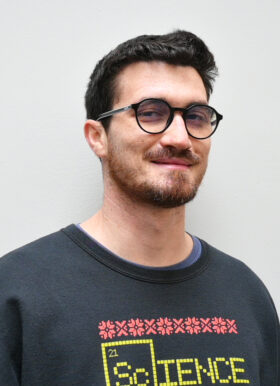
Gustavo Gastão Davanzo, PhD
Postdoctoral Research Associate, Kipnis Lab
- Phone: 314-685-5740
- Email: davanzo@nospam.wustl.edu
Division
- Immunobiology
Lab Website
Education
- B. Sc., Life Sciences, State University of Campinas, Campinas, SP, Brazil (2011-2015)
- L. Sc., Life Sciences, State University of Campinas, Campinas, SP, Brazil (2011-2017)
- Ms. Science in Physiology at Prof. Dra. Lisete Compagno Michelini, University of São Paulo, São Paulo, SP, Brazil (2015-2017)
- Internship abroad at Lev Becker Laboratory, University of Chicago, Chicago, IL, USA (2019-2020)
- Ph.D. at Laboratory of Immunometabolism Prof. Dr. Pedro Moraes-Vieira, State University of Campinas, Campinas, SP, Brazil (2017-2022)
- Postdoc Research Associate at Jonathan Kipnis Laboratory – Washington University (2022-present)
Honors & Awards
- Honorable mention at Thereza Kipnis Award at the 45th Congress of the Brazilian Society of Immunology (2021)
- Best Poster award in Immunology field at GBMeeting: Postgraduate Meeting in Genetics and Molecular Biology, University of Campinas (2019)
- Best Poster award Ph.D. student 43rd Congress of the Brazilian Society of Immunology (2018)
- 3rd Place Poster Prize Immunological Aspects of Metabolic Syndrome, Federation of American Societies for Experimental Biology (2018)
Research Areas of Interest
- Immunology, Neuroscience, Immunometabolism
Research Statement
In the last 10 years, I have been studying how immune cells are involved in the maintenance of tissue homeostasis in the context of different diseases, such as hypertension, obesity, COVID-19, and neurodegenerative diseases. In all the steps of my formation, my work has been recognized by worldwide peers as excellent, including awards in national and international conferences, publications in high-impactful journals, and collaboration with recognized scientists in the fields.
In my Ph.D. I had the opportunity to get a deep understanding of a completely new scientific area called immunometabolism, which studies how metabolism shapes the immune response in different contexts. Considering that the field has been less than 15 years of creation, I consider that I am in a strategic position in the scientific community. Furthermore, my master’s training in neurophysiology adaptations of hypertension, associated with my Ph.D. training in immunometabolism in the context of metabolic (obesity and insulin resistance) and infectious diseases (bacterial and SARS-CoV-2) allows me to have a broad understanding of physiology and immunity during diseases. All this knowledge has been applied in my current position as a postdoc research associate, where I am working with the most important scientist in the field of neuroimmunology, Professor Jonathan Kipnis, in which laboratory was discovered that the meninges presented a lymphatic system that drains the waste from the brain to the draining lymph nodes. In his lab, I am working on the border of scientific knowledge trying to understand why the brain is immune privileged and how neurodegenerative diseases (such as Alzheimer’s disease) and aging affect it.